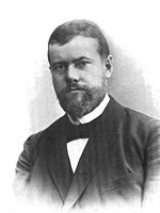
Max Weber
Topics
Max Weber
Quotations

Quotations
Maximilian Carl Emil Weber (1864-04-21 – 1920-06-14) was a German sociologist and political economist.
Sourced
- Denn obwohl der moderne Mensch im ganzen selbst beim besten Willen nicht imstande zu sein pflegt, sich die Bedeutung, welche religiöse Bewußtseinsinhalte auf die Lebensführung, die Kultur und die Volkscharaktere gehabt haben, so groß vorzustellen, wie sie tatsächlich gewesen ist, so kann es dennoch natürlich nicht die Absicht sein, an Stelle einer einseitig »materialistischen« eine ebenso einseitig spiritualistische kausale Kultur- und Geschichtsdeutung zu setzen. Beide sind gleich möglich, aber mit beiden ist, wenn sie nicht Vorarbeit, sondern Abschluß der Untersuchung zu sein beanspruchen, der historischen Wahrheit gleich wenig gedient.
- The modern man is in general, even with the best will, unable to give religious ideas a significance for culture and national character which they deserve. But one can, of course, not aim to replace a one-sided materialistic with an equally one-sided spiritualistic causal interpretation of culture and of history. Each is equally possible, but each, if it does not serve as the preparation, but as the conclusion of an investigation, accomplish equally little in the interest of historical truth.
- The Protestant Ethic and the Spirit of Capitalism [Die protestantische Ethik und der Geist des Kapitalismus] (1904-5), in Archiv für Sozialwissenschaften und Sozialpolitik, vol. 20 - Full English translation online
- The modern man is in general, even with the best will, unable to give religious ideas a significance for culture and national character which they deserve. But one can, of course, not aim to replace a one-sided materialistic with an equally one-sided spiritualistic causal interpretation of culture and of history. Each is equally possible, but each, if it does not serve as the preparation, but as the conclusion of an investigation, accomplish equally little in the interest of historical truth.
- The fate of our times is characterized by rationalization and intellectualization and, above all, by the disenchantment of the world. Precisely the ultimate and most sublime values have retreated from public life either into the transcendental realm of mystic life or into the brotherliness of direct and personal human relations. It is not accidental that our greatest art is intimate and not monumental.
- Science as a Vocation [Wissenschaft als Beruf] (1918)
- Mysticism intends a state of "possession," not action, and the individual is not a tool but a "vessel" of the divine. Action in the world must thus appear as endangering the absolutely irrational and other-worldly religious state. Active asceticism operates within the world; rationally active asceticism, in mastering the world, seeks to tame what is creatural and wicked through work in a worldly "vocation" (inner-worldly asceticism). Such asceticism contrasts radically with mysticism, if the latter draws the full conclusion of fleeing from the world (contemplative flight from the world). The contrast is tempered, however, if active asceticism confines itself to keeping down and to overcoming creatural wickedness in the actor's own nature. For then it enhances the concentration on the firmly established God-willed and active redemptory accomplishments to the point of avoiding any action in the orders of the world (asceticist flight from the world). Thereby active asceticism in external bearing comes close to contemplative flight from the world. The contrast between asceticism and mysticism is also tempered if the contemplative mystic does not draw the conclusion that he should flee from the world, but, like the inner-worldly asceticist, remain in the orders of the world (inner-worldly mysticism).
In both cases the contrast can actually disappear in practice and some combination of both forms of the quest for salvation may occur. But the contrast may continue to exist even under the veil of external similarity. For the true mystic the principle continues to hold: the creature must be silent so that God may speak.
- The Truth is the Truth.
- Last words, as quoted in Prophets of Yesterday : Studies in European Culture, 1890-1914 (1961) by Gerhard Masur, p. 201
- Since Judaism made Christianity possible and gave it the character of a religion essentially free from magic, it rendered an important service from the point of view of economic history. For the dominance of magic outside the sphere in which Christianity has prevailed in one of the most serious obstructions to the rationalization of economic life. Magic involves a stereotyping of technology and economic relations. When attempts were made in China to inaugurate the building of railroads and factories a conflict with geomancy ensued ... Similar is the relation to capitalism of the castes in India. Every new technical process which an Indian employs signifies for him first of all that he leaves his caste and falls into another, necessarily lower ... An additional fact is that every caste makes every other caste impure. In consequence, workmen who dare not accept a vessel filled with water from each other's hands, cannot be employed together in the same factory room. Obviously, capitalism could not develop in an economic group thus bound hand and foot by magical means.
- General Economic History, trans. by Wikipedia:Frank Knight, p 265.
Quotes about Weber
- Max Weber and Vladimir Lenin say, in almost identical words, that with regard to the use of force the state is always a dictatorship.
- Michael Hardt and Antonio Negri, Multitude
Silverdale Interactive © 2026. All Rights Reserved.

